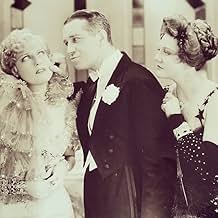IMDb RATING
7.2/10
3.4K
YOUR RATING
When a small kingdom's main taxpayer leaves for Paris, its king dispatches a dashing count to win back her allegiance.When a small kingdom's main taxpayer leaves for Paris, its king dispatches a dashing count to win back her allegiance.When a small kingdom's main taxpayer leaves for Paris, its king dispatches a dashing count to win back her allegiance.
- Won 1 Oscar
- 1 win total
Louis Adlon
- Wide Eyed Admirer
- (uncredited)
Storyline
Did you know
- TriviaDuring a recent showing on TCM, it was stated that Jeanette MacDonald and Maurice Chevalier did not get along on this film. He called her a "prude" and she called him "a bottom pincher". Their relationship had been deteriorating for some time, and this was the last film they appeared in together.
- GoofsWhen Sonia tears off a calendar sheet, it reads "Thursday, May III, 1885". However, May 3, 1885 was actually a Sunday.
- Alternate versionsA French version of this film, also starring Maurice Chevalier and Jeanette MacDonald, was filmed at the same time as this one.
- ConnectionsFeatured in Monsieur Cinéma: Episode dated 23 January 1972 (1972)
- SoundtracksGirls, Girls, Girls
by Franz Lehár
Featured review
The Monarch of Marshovia sends a romantic count to Paris to woo back THE MERRY WIDOW whose vast wealth is vital to running the tiny kingdom.
Nine years after producing a non-talking film based on the Franz Lehár operetta, MGM mined the same material again, this time as a musical comedy. The Studio would give the film its trademark opulent treatment, with production values of the highest order. Celebrated lyricist Lorenz Hart was engaged to write words for the music. And, to make absolutely certain of success, director Ernst Lubitsch and stars Maurice Chevalier & Jeanette MacDonald were reunited to duplicate their previous triumphs at Paramount Studios.
If, ultimately, the film does not have quite the effervescence of Lubitsch's previous pictures, this is probably understandable. MGM, while wonderful with epics and dramas, often took an unnecessarily heavy-handed approach to subjects which should have been given a lighter, airier treatment. Also, the film was released a few months after the imposition of the Production Code, which obviously had a significant effect upon the movie's final persona.
Chevalier & MacDonald continue the on screen relationship already well established in their earlier films: she, the rather aloof and powerful female who needs a good man; he, the social inferior who wins her with his enormous Gallic charm. Their singing is vivacious & charming and sometimes you can almost understand her words.
Unlike the 1925 version of THE MERRY WIDOW, there is no villain here to provide dramatic tension. The costars, however, provide much comic amusement. Foremost among them is waspish Edward Everett Horton, very funny as Marshovia's nervous Ambassador in Paris. Rotund George Barbier & sprightly Una Merkel make the most of their small roles as the diminutive nation's conniving King and flirtatious Queen.
Some of the smaller roles are also humorously cast: Sterling Holloway as Chevalier's loyal orderly; Donald Meek as the King's gossipy valet; and Herman Bing as Horton's dramatic factotum.
Movie mavens will recognize Akim Tamiroff as the head waiter at Maxim's & Arthur Housman as a drunk (what else?) trying to gain entry into that establishment, both uncredited.
Nine years after producing a non-talking film based on the Franz Lehár operetta, MGM mined the same material again, this time as a musical comedy. The Studio would give the film its trademark opulent treatment, with production values of the highest order. Celebrated lyricist Lorenz Hart was engaged to write words for the music. And, to make absolutely certain of success, director Ernst Lubitsch and stars Maurice Chevalier & Jeanette MacDonald were reunited to duplicate their previous triumphs at Paramount Studios.
If, ultimately, the film does not have quite the effervescence of Lubitsch's previous pictures, this is probably understandable. MGM, while wonderful with epics and dramas, often took an unnecessarily heavy-handed approach to subjects which should have been given a lighter, airier treatment. Also, the film was released a few months after the imposition of the Production Code, which obviously had a significant effect upon the movie's final persona.
Chevalier & MacDonald continue the on screen relationship already well established in their earlier films: she, the rather aloof and powerful female who needs a good man; he, the social inferior who wins her with his enormous Gallic charm. Their singing is vivacious & charming and sometimes you can almost understand her words.
Unlike the 1925 version of THE MERRY WIDOW, there is no villain here to provide dramatic tension. The costars, however, provide much comic amusement. Foremost among them is waspish Edward Everett Horton, very funny as Marshovia's nervous Ambassador in Paris. Rotund George Barbier & sprightly Una Merkel make the most of their small roles as the diminutive nation's conniving King and flirtatious Queen.
Some of the smaller roles are also humorously cast: Sterling Holloway as Chevalier's loyal orderly; Donald Meek as the King's gossipy valet; and Herman Bing as Horton's dramatic factotum.
Movie mavens will recognize Akim Tamiroff as the head waiter at Maxim's & Arthur Housman as a drunk (what else?) trying to gain entry into that establishment, both uncredited.
- Ron Oliver
- Oct 9, 2004
- Permalink
- How long is The Merry Widow?Powered by Alexa
Details
- Release date
- Country of origin
- Languages
- Also known as
- Vesela udovica
- Filming locations
- Production company
- See more company credits at IMDbPro
Box office
- Gross US & Canada
- $329,180
- Gross worldwide
- $6,014,620
- Runtime1 hour 39 minutes
- Color
- Aspect ratio
- 1.37 : 1
Contribute to this page
Suggest an edit or add missing content




























